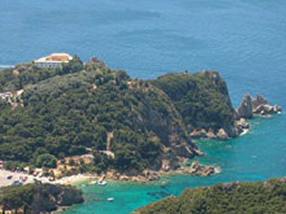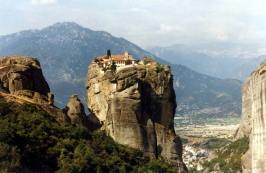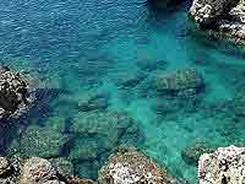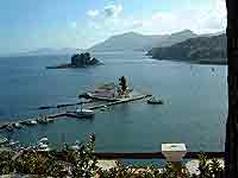 |
[Published recently in Lawrence Durrell and the Greek World, ed. Anna Lillios (Susquehanna University Press, 2004), these poems were written by David Radavich following a trip to Corfu, Greece in the summer of 2000. The accompanying photographs were taken by Jamie Gifford of the University of Alberta.—JDK.]
What remains of love?
Censure in the blood, memory
that lies, a taste of olive or honey
that will not leave?
I try to enter that church
with its storied frescoes, candles
to buy and ease our troubled
stumbling—yet the door
is only sometimes parted
to let in light and shadow,
this dance of having been and left
some dusty footprints of ourselves
that might be called feeling,
recollection, new mind
probing after
days made somehow
more beautiful for being
in this place, with you
in colors of the sky
somehow more elemental,
akin to sharp living that cuts
through rock and plies cold seas
of so much human unknowing,
resides now somewhere
in this biochemistry of self.
§§
SAINT SPYRIDON
Why, exactly,
do they kiss
these bones?
A silver
sarcophagus ringed in lamps,
miniature portraits of madonnas
and saints, a line of believers
leading out the corner room,
out past the altar-rail, out to sun
and the world of shops and traffic horns
that bring
us all to this place
of tawny colors: drapes, candelabras,
gold leaf that dances overhead
for those who kneel.
Almost everyone,
old and young,
removes a golden tallow, pays and parts
to the sandy plot where prayers
are planted, sometimes answered,
always voiced
in thoughts
icons bring to consciousness,
seeking to draw out through the mouth
to mumbling and the light of day
outside
a place where bones
have lain for centuries, they say,
and saved a few from catastrophe—
If lips keep demons away.
§§
TAVERNA
Where is there joy
without food?
Platters
come balancing
over us, course after course,
framed in hanging vines
above the
hillside giddy
with carafes of wine
that cool the noonday sun.
Everyone
overeats and naps,
this part of living where
time moves slowly
knowing itself.
From their
easy balconies
townspeople wonder
who the gargoyles are, what
toasts we raise
calling
our pleasure with
a foreign tongue.
§§
OUTING
 |
Winding is what I remember.
Streets
and shops and mountain roads,
sharp reverses and that hanging
in the air before the curve
corrects us to the path we know
goes forward.
Not serpent:
Corkscrew
leading downward like the city bus
into the town, natives alighting,
embarking, to buy, to work,
to feed these tourists
seeking to find their center
and pull out that cork:
Taste the
heady wine of sea
and history and rock and breeze
sunning at the base of
such pure spirals
we feel
a bit dizzy
from the ups and downs
of life being pulled out slowly,
forcefully
as a clock
reaming out our centuries.
§§
METEORA
 |
I’ve often wondered how monks
can live atop mountains,
never coming down.
Now women
have joined them
in separate houses, perched
on pinnacles that jut out impossibly
like ancient eyeteeth,
just the
miracles
they look to be beyond
human knowing or doing,
impossibly
intricate painting
and stones now crowded with tourists
who can’t quite climb the faith
of these
contemplators
yet buy their crosses, stare
at icons, stand back with cameras
trying to frame God
so high, so remote
we feel
faint climbing
down, massaging our knees,
leaving all those colors
in busses headed
to the flat known world.
§§
WARNING
 |
I don’t want to take your time
for what is not essential.
A boat is
the safest way
to get there, despite the rocking,
our pilot
knows the way
many times over, we’re tipping
but it’s only temporary
and the
breeze is beguiling
if the sun still burns.
The shortest
linkage between
two points is oftentimes this chasm
filled with the unknown,
deadly if
you do not love,
tempting as oblivion, new harboring,
or just a cleansing of our ways
before we retouch rock—
gingerly,
knowing these urchins
can land us with
black spikes or sudden
lovers who can sting for days.
§§
BORDERING
 |
Poems have no meaning
in a life that’s full.
Emptiness finds its match.
We all plug
in our needs and hope
for remaining. Those who live among
stones know the unforgiving
exposure
to every element,
how irrelevancies take flight and
hang their cloaks in our bags
heavy with
departing,
dark as the closure of locks
and tags and customs we must pay
to travel where we’ll never
see our words alone.
§§